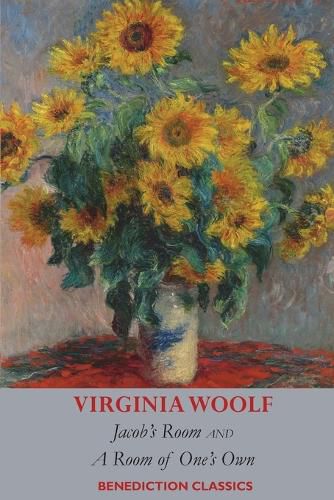Readings Newsletter
Become a Readings Member to make your shopping experience even easier.
Sign in or sign up for free!
You’re not far away from qualifying for FREE standard shipping within Australia
You’ve qualified for FREE standard shipping within Australia
The cart is loading…






This title is printed to order. This book may have been self-published. If so, we cannot guarantee the quality of the content. In the main most books will have gone through the editing process however some may not. We therefore suggest that you be aware of this before ordering this book. If in doubt check either the author or publisher’s details as we are unable to accept any returns unless they are faulty. Please contact us if you have any questions.
"Sheer poetry ... it may be dubbed a lyrical novel", The New York Times, of Jacob's Room.
"No plainer manifestation of the modernist trend in contemporary English fiction may be found than in Virginia Woolf's Jacob's Room." The New York Times.
"No need to hurry. No need to sparkle. No need to be anybody but oneself." Virginia Woolf, A Room of One's Own.
"Seldom has the point been driven home more cogently or embellished with wittier comment". The New York Times, of A Room of One's Own.
Jacob's Room was Virginia Woolf's first modernist novel. It centers on the character of Jacob Flanders, a lonely young man who struggles to reconcile his love of classical culture with the chaotic reality of contemporary society, particularly the turbulence of World War I, and ends with an oblique reference to his death. Nevertheless, the reader leaves with a fine realization of the intrinsic beauty of life and a sense that Jacob has been victorious in his brief wrestling with life.
A Room of One's Own is a classic of feminist literature and an important work of literary criticism. Woolf begins with her well-known aphorism, "A woman must have money and a room of her own if she is to write fiction," but then addresses "the great problem of the true nature of woman and the true nature of fiction". She describes the position of women in her society and the past, and how it relates to their creativity, and explains what is required of any man or woman to write great fiction. This erudite extended essay is charmingly conversational.
Virginia Woolf was of course a great novelist, but she has influenced literature in many ways. She and her husband Leonard Woolf set up and ran the Hogarth Press, which published works by key modernist writers as well as important works in translation. In their first five years, they published Katherine Mansfield, T. S. Eliot, E. M. Forster, Clive Bell, Roger Fry, and Sigmund Freud, but also rejected James Joyce's Ulysses. She reviewed extensively and wrote on the art of writing and on the form of the novel. Through her stylistic innovations, such as the stream of consciousness, Virginia Woolf, like James Joyce, changed the course of literature.
$9.00 standard shipping within Australia
FREE standard shipping within Australia for orders over $100.00
Express & International shipping calculated at checkout
This title is printed to order. This book may have been self-published. If so, we cannot guarantee the quality of the content. In the main most books will have gone through the editing process however some may not. We therefore suggest that you be aware of this before ordering this book. If in doubt check either the author or publisher’s details as we are unable to accept any returns unless they are faulty. Please contact us if you have any questions.
"Sheer poetry ... it may be dubbed a lyrical novel", The New York Times, of Jacob's Room.
"No plainer manifestation of the modernist trend in contemporary English fiction may be found than in Virginia Woolf's Jacob's Room." The New York Times.
"No need to hurry. No need to sparkle. No need to be anybody but oneself." Virginia Woolf, A Room of One's Own.
"Seldom has the point been driven home more cogently or embellished with wittier comment". The New York Times, of A Room of One's Own.
Jacob's Room was Virginia Woolf's first modernist novel. It centers on the character of Jacob Flanders, a lonely young man who struggles to reconcile his love of classical culture with the chaotic reality of contemporary society, particularly the turbulence of World War I, and ends with an oblique reference to his death. Nevertheless, the reader leaves with a fine realization of the intrinsic beauty of life and a sense that Jacob has been victorious in his brief wrestling with life.
A Room of One's Own is a classic of feminist literature and an important work of literary criticism. Woolf begins with her well-known aphorism, "A woman must have money and a room of her own if she is to write fiction," but then addresses "the great problem of the true nature of woman and the true nature of fiction". She describes the position of women in her society and the past, and how it relates to their creativity, and explains what is required of any man or woman to write great fiction. This erudite extended essay is charmingly conversational.
Virginia Woolf was of course a great novelist, but she has influenced literature in many ways. She and her husband Leonard Woolf set up and ran the Hogarth Press, which published works by key modernist writers as well as important works in translation. In their first five years, they published Katherine Mansfield, T. S. Eliot, E. M. Forster, Clive Bell, Roger Fry, and Sigmund Freud, but also rejected James Joyce's Ulysses. She reviewed extensively and wrote on the art of writing and on the form of the novel. Through her stylistic innovations, such as the stream of consciousness, Virginia Woolf, like James Joyce, changed the course of literature.